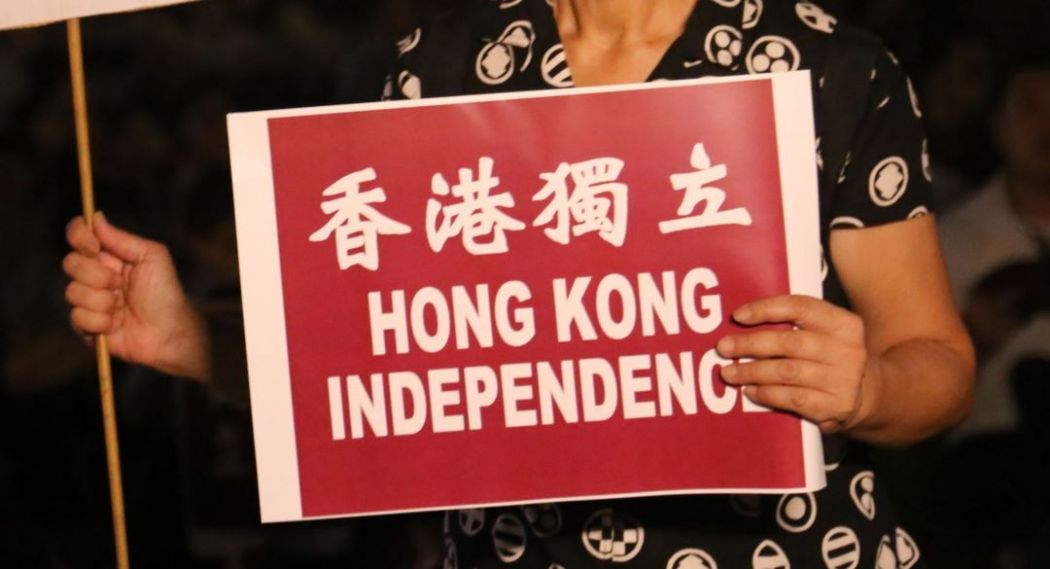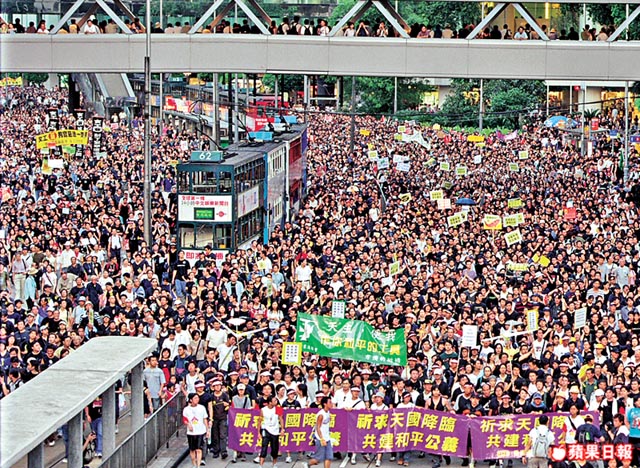Recently, Hong Kong government officials, university heads and Communist Party allies have declared in chorus (indeed, it seems suspiciously orchestrated) that advocating independence for Hong Kong is illegal and against the Basic Law. Most legal experts, who tend to be pro-democracy, say that it is not illegal, though they seem less certain of whether it violates the Basic Law. Indeed, in a recent interview, Benny Tai was quoted as saying it does.
Even the most recent statement by 12 university student unions, who have bravely lead the defence of the right to freedom of expression over the Hong Kong independence posters and banners on campuses, only defends the right to “discuss” independence without mentioning whether or not that extends to the right to advocate it.

It may be useful to clarify that advocating independence for Hong Kong is neither illegal nor against the Basic Law. (Here, “illegal” means a criminal offence; “against the Basic Law” means unconstitutional.)
Let’s start with the issue of illegality since that is more straightforward. No one has ever been charged with a crime, let alone prosecuted or convicted, related to advocating independence. There is no statute in the Crimes Ordinance which specifically forbids independence advocacy. Basic Law Article 39 states, “The rights and freedoms enjoyed by Hong Kong residents shall not be restricted unless as prescribed by law.” In other words, if you say some kind of speech is illegal, you have to point to a law that forbids it; otherwise, it’s not only permitted but protected.
Statute on seditious intent
Most of those who say independence advocacy is illegal don’t bother to cite any law, but those who have, such as two former Bar Association chairs, Ronny Tong and Winnie Tam, say that it may violate the statute on seditious intent (Chapter 200, section 9 of the Crimes Ordinance). Since the handover, no one has ever been prosecuted for this crime. It is a problematically vague old colonial relic. It defines seditious intention as an intention to “bring into hatred or contempt or to excite disaffection” against the Queen or Hong Kong government or to “raise discontent or disaffection” amongst Hong Kong people against same.
But firstly, this is an exceedingly low threshold: In general use, seditious speech means that which incites rebellion against a state. Secondly, it is within my rights to criticise the government, even with the intent of bringing it “into hatred or contempt or excite disaffection.” Indeed, it could be argued that the Party and Hong Kong government do so better than anyone else, though probably without that intention. And lastly, the banners do no such thing: they advocate a particular status for Hong Kong. The whole issue of Hong Kong’s political status is unsettled and is surely to arise come the end of the “one country, two systems” period in 2047. Rather than being unlawful to discuss Hong Kong’s political status, it is responsible to do so and certainly not “seditious,” whether intentionally or not.

In 1997, just before the handover, Legco was for a very brief time controlled by democrats. (At the stroke of midnight, July 1, 1997, the Communist Party kicked them out and installed its own entirely unelected Legco.) That pre-handover Legco contemplated abolishing the seditious intent statute entirely and then decided to keep it, for fear that the Communist Party might use lack of anything of the sort to justify rushing introduction of Article 23 legislation on treason, secession, sedition, subversion and the like. Instead of abolishing it, Legco inserted restrictions intended to prevent it from being misused.
As it happened, the Party did rush Article 23 legislation anyway, in 2003, and was roundly defeated by the people of Hong Kong who came out to the streets half a million strong to say no. As a result, there are no laws forbidding advocacy of any forms of political status for Hong Kong, whether its present form or any other. While the government has rumbled and thundered about independence advocacy’s illegality, it’s so far taken no action. If it does, it will be a watershed moment for Hong Kong, yet another attack on a basic right that will test the independence of the judiciary.
Turning to whether independence advocacy “is against” or “violates” the Basic Law: Really what people who say things like this mean is that it contradicts the Basic Law, which, to be clear, is no crime. They usually refer to Article 1: “The Hong Kong Special Administrative Region is an inalienable part of the People’s Republic of China.” On the surface, that sounds quite unequivocal, but within constitutional documents such as the Basic Law, there are often tensions between different clauses. Constitutional issues are open to interpretation — that’s why many countries have constitutional courts.

Basic Law Article 39 says Hong Kong is party to both the International Covenant on Civil and Political Rights and the International Covenant on Economic, Social, and Cultural Rights. The very first right– Article 1 in fact– guaranteed in both the ICCPR and ICESCR (indeed, it’s the only right to appear in both) is the right of self-determination, which includes the right of peoples to determine their political status: “All peoples have the right of self-determination. By virtue of that right they freely determine their political status and freely pursue their economic, social and cultural development.”
How to resolve the tension between Article 1, which asserts that the Hong Kong SAR is an inalienable part of the PRC, and Article 39, which obliges Hong Kong to comply with the ICESCR and the ICCPR, including their guarantee of the right of self-determination?
Right of self-determination
When Article 1 asserts the Hong Kong SAR is an inalienable part of the PRC, we should ask, Says who? Who made the Basic Law? It certainly wasn’t Hong Kong people. In fact, Hong Kong people had no formal or representative participation in its articulation. The whole process was controlled by the Communist Party. And Hong Kong people had no opportunity to formally approve the Basic Law, for example by a referendum; it was imposed upon them. Indeed, in their entire modern history, under both British colonial and now Communist Party rule, Hong Kong people have never been granted the right of self-determination, which includes the right to determine their political status.
If Hong Kong people had formally agreed to being handed over by the UK to the PRC, had participated in the articulation of the Basic Law, and had voted in free and fair referendums to be transferred to PRC sovereignty and to approve the Basic Law, one might say: Hong Kong people, you have made your bed and now you must sleep in it. But that is not the case. Hong Kong people have never made their bed; it’s always been made by someone else. And no state has the right to determine a people’s political status on their behalf, especially by incorporating them into said state without their formal approval.
From the point of view of international law, therefore, in the case of Hong Kong, the right of self-determination trumps state claims to sovereignty. Even international law experts who argue for a very restrictive interpretation of the right of self-determination allow that when rights have been denied and there is no other recourse to gain them, the right of self-determination is invoked.

Surely, even according to the strictest interpretation, the Communist Party’s denial of genuine universal suffrage on 31 August 2014 triggered this right. Indeed, we could say that a dictatorship not only denying a people their right of self-determination but then declaring their territory an inalienable part of the state ruled by the dictatorship and then on top of that, refusing to fulfil the legal obligation to grant them full and genuine universal suffrage, is the very definition of tyranny.
Thus, Hong Kong people are perfectly within their rights, as articulated in both the Basic Law and international law, to advocate independence and to determine their political status.
If I were to make this case before the Hong Kong High Court, would the judges rule in my favour? Probably not: They tend to be conservative, hewing closely and selectively to precedent, and pay little heed to Hong Kong’s obligations under international treaties to which Hong Kong is party. On top of that, the right of self-determination has never been specifically “implemented through laws of the HKSAR”, as Article 39 requires Hong Kong to do. And even if the judges did rule in my favour, ultimately Hong Kong is not ruled by law but by an entity called the National People’s Congress Standing Committee, which is not an independent judicial organ but essentially an arm of the Communist Party.
So Hong Kong is ruled not by law but by the Communist Party. And the chances of it ever ruling in my favour… well, that happens to be one of the reasons many think Hong Kong will never get justice (or genuine universal suffrage) under this regime and that some other solution, such as independence, must be found to guarantee Hong Kong people’s full democratic and political rights.
Kong Tsung-gan is author of Umbrella: A Political Tale from Hong Kong. Thanks to his generosity, Hong Kong residents can receive a hard copy in the post if you make a HK$200 minimum donation to Hong Kong Free Press. Click for details.
